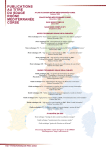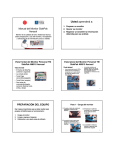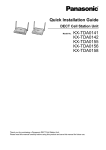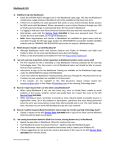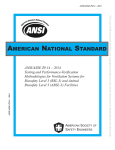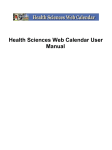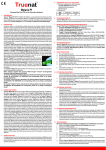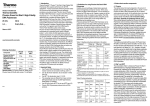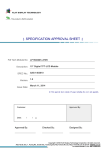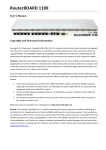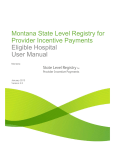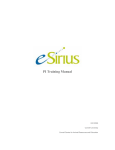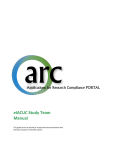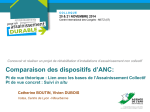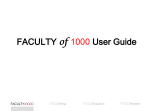Download December 2011 - Institutional Animal Care and Use Committee
Transcript
December 2011 IACUC Newsflash THE UNIVERSITY OF PITTSBURGH LEADER IN EDUCATION • PIONEER IN RESEARCH • PARTNER IN REGIONAL DEVELOPMENT In this Issue: • ARO is HERE! What you need to know • HSLS Spotlight • Compliance Q&A • Reminders, Tips and Updates • Controlled Substance Policy Regardless of the weather, Phipps Conservatory (Only a short walk from the Oakland campus) offers a lush and tropical escape. University of Pittsburgh • IACUC Dear Research Community, The Fall Semi-Annual Review of our program has concluded, and I would like to thank you all for your time and candidness during our visits. I am happy to report that, despite the external pressures of decreased funding and increased regulation, the University’s research community continues to excel. As we move forward into the new year, I am confident that the IACUC and the investigators here at Pitt will continue to work effectively together to conduct cutting edge research and to promote excellence in animal care. On our end, we are rolling out a new Online Protocol Management System (ARO) which will decrease review time for your protocols and allow for easy online access at any time. We have also redesigned our website (www.iacuc.pitt.edu) to make it more user friendly; the new site will launch early in the new year. Please take some time to explore ARO and our new website, and as always, I invite you to contact me with any comments or questions you may have. Keep in mind that our goal is to assist you in your research endeavors, so that your animal based research can be completed in a manner compliant with federal, state, and institutional policies. If, at any point during your research you have a question regarding these policies, do not hesitate to contact the IACUC office! We can offer you answers to your questions, training for you and your staff, and information related to all facets of your animal based research. Lastly, I want to wish you and your families a safe and happy holiday season. I look forward to seeing you all again in the coming year. Very Best, Dr. Denise Capozzi • Animal Care and Use Program Animal Order Deadline and Delivery Changes for the 2011 Winter Recess Due to the University’s Winter Recess closure from Friday, December 23, 2011 through Monday, January 2, 2012, no animals will be delivered and no orders will be processed. The ordering deadline will be changed to 5:00 PM Monday, December 19 for delivery Tuesday, January 3 through Friday, January 6, 2012. To reiterate, if you need an animal delivered from January 3 through January 6, 2012, the order must be placed by 5:00 PM Monday, December 19, and the delivery date must be noted on the order. Vendor delivery schedules for the week of December 19 will be as follows: • Hilltop will deliver Monday, December 19 and Wednesday, December 21. • Charles River and Harlan will deliver on Tuesday, December 20. • Taconic will deliver on Tuesday, December 20 and Thursday, December 22. • Jackson Laboratory will deliver on Wednesday, December 21. The normal DLAR ordering and delivery schedule will resume on Tuesday, January 3, 2012. Orders placed by 5:00 PM Tuesday, January 3 will be scheduled for delivery the following week, January 9 - 13, 2012. University of Pittsburgh • IACUC • Animal Care and Use Program Animal Research Online (ARO) Effective on January 1, 2012, emailed submissions of new IACUC protocols will no longer be accepted. All new protocols and three-year renewals must be entered into ARO. ACCESSING ARO: * Obtain login credentials for ARO: You should use the same login address for ARO that you use for logging into the system for web-based training (the HSConnect system). All users who have completed the standard animal investigator training modules (“Research Integrity” and “Use of Laboratory Animals in Research and Education”) should have access to the system. However, only PITT faculty members and senior staff members have the ability to initiate a new protocol submission. * Access Requirements: Anyone who has completed the “Research Integrity” training module in addition to completing the “Use of Laboratory Animals in Research and Education” training module during the past 3 years should have access to the ARO system. If you cannot login to the system, please make sure that your training is current by logging into the training system (http://cme.hs.pitt.edu/). If training is current, please contact the IACUC Office for assistance (412-3832008). * Student access for ARO: Once a protocol is approved, any person listed on the protocol can read the protocol online by logging into ARO. However, students will be unable to initiate a new protocol application in the system. As a security feature, only University of Pittsburgh faculty members and senior staff members can initiate a new protocol application. RESOURCES: A comprehensive user manual for ARO is available at: (http://www.iacuc.pitt.edu/ARO/AROUserGuide.pdf) Live training sessions on the use of ARO occur every Thursday at 2 PM in the IACUC Office: room 206 of the Hieber Building (located on Fifth Avenue across from the BST-III; Hieber’s pharmacy is located in the same building). Space is limited; reservations should be arranged through Michael Kessler ([email protected]). Advantages of Using ARO: • The answers to one question dictate follow-up questions; if a question is irrelevant to your protocol, you will never have to address it. • We have worked with Environmental Health and Safety (EH&S) to include the information needed for their risk assessments in ARO. Say goodbye to the EH&S Workbook! Workbook submssions are not needed to accompany IACUC protocols submitted via ARO. • When your protocol is approved, the approval letter is immediately available by loggng into the ARO system. You can retrieve and print a copy of the approval letter at any time. • The processing of your protocol can be tracked in real-time via the system. You can follow the progress of your protocol review by logging into ARO. • Once approved, anyone listed on the protocol will have access to it by logging into ARO. This simplifies distributing the currently-approved protocol version to a co-investigator. • ARO is linked to the IACUC training database, making it easy to add lab members to a protocol just by typing their last name (a list appears of all matches, and you can select the appropriate person). • Submitting protocol modifications is streamlined and simpler. • Three years down the line, submitting a three-year renewal is far easier. You simply need to generate a “clone” of your protocol and modify the sections requiring changes. University of Pittsburgh • IACUC • Animal Care and Use Program Compliance Question & Answer Policy (specifically that which involves animals in research) is dynamic, complex, and often controversial. As always, we encourage dialogue between our offices and our investigators so that, as a community, we can remain in compliance. During the past six months, many of you have come forward with excellent questions. Of these, we’ve chosen the most relevant, and provided them here- along with the answers. Q: I will be collaborating with another institution for my research. I have IACUC approval to do the work at Pitt; do I need to do anything else before my collaborator can begin? A: The IACUC understands and appreciates the collaborative nature of research; however, there are federal and AAALAC policies that dictate whether or not the work can be done. If you plan on having any animal work done outside of Pitt, it must be specifically approved by an IACUC. What is required for approval if the funding is administered through Pitt and the work is done under a protocol at another institution? 1. PHS Policy requires that all awardees and performance sites hold an approved Animal Welfare Assurance 2. The performing institution must have the required USDA registration 3 The performing institution must be AAALAC accredited (or, for Canadian institutions, certified by the Canadian Council on Animal Care (CCAC)) 4. The University of Pittsburgh IACUC must receive a copy of the approved protocol from the performing institution 5. The University of Pittsburgh IACUC must receive a copy of the performing institution’s semi annual report for the year(s) the study entails or information about any significant questions or issues raised during a semiannual program inspection 6. The University of Pittsburgh IACUC must receive a copy of the annual renewal approval from the performing institution If any of the requirements 1 – 6 are not met, the PI will be required to submit a protocol to the University of Pittsburgh IACUC for review. Q: I have experienced an unexpected animal death or illness during the course of my approved research. What is my responsibility? A: Researchers or their designees must report adverse events using the AE reporting form found at: http://www.iacuc.pitt.edu/sop/AEReportingSOP.doc The University of Pittsburgh defines an Adverse Event as an unexpected or excessive, unfavorable clinical outcome to research manipulation resulting in either: a)levels of mortality exceeding by 10% or greater than that which was anticipated in the approved protocol* (This includes both spontaneous animal deaths and animals being euthanized due to reaching either studyspecified or other humane end-points) b)mortality due to complications unanticipated in the approved protocol c)high levels of “cluster” mortality** Adverse events are generally associated with animal deaths. However, investigators should also report animal morbidity occurring either in frequency or severity beyond that anticipated in the approved protocol. In particular, morbid complications leading to unanticipated animal discomfort – especially those creating difficult to manage levels of pain and distress or situations of uncontrollable pain or distress (i.e. - Category E conditions), should be reported. * In many studies, initial mortality may be higher than that experienced later in the project – a “learning/experience curve” effect. Although adverse event reporting is not definitively required until animal losses in absolute terms exceeds that predicted in the protocol, it is considered advantageous to report unexpectedly high levels of early, relative mortality (i.e. mortality to date divided by animals used to date). ** Cluster mortality is defined as a grouping of animal deaths occurring closely together, significantly above anticipated study loss levels University of Pittsburgh • IACUC • Animal Care and Use Program Reminders Animal Welfare is Everyone’s Responsibility: While the DLAR has been charged with caring for all research animals in their facilities, it is still important to do your part to assure their welfare. • Every time you remove a housing unit, assure that the adequate food, water, and ventilation are available once it is returned to the rack, and before leaving the room. • If you see someone or something that looks out of place, notify the RCCO and DLAR immediately. • Always follow your approved IACUC protocol exactly, and do not deviate from what is written. If a clinical procedure must be performed which is not on your protocol, contact the Univesity Vet Services before taking any action. It is University Policy and required by the AWA that all secondary containers in an animal use or housing area must be labeled! This includes syringes filled with saline or anything else, regardless of when you plan on using them. The required information on these labels is: All chemicals, which are transferred into a secondary container, must be labeled with a minimum of the following information. a. Identity of the hazardous chemical (Chemical Name) b. Concentration c. Date of preparation d. Expiration date (if applicable) When secondary containers are used to hold pharmaceuticals, the container must be labeled with a minimum of the following information*. i. Identity of the pharmaceutical (Common and Generic Name) ii. Name of individual preparing or transferring pharmaceutical iii. Expiration date iv. Date mixed Tips • Avoid Non-Compliance and added Costs!!! Breeding rodents is an essential component to many research programs, and requires a high degree of organization and management. It is University policy (derived from the space requirements of the Guide) that all mouse litters are weaned at 28 days after birth. If a litter has not been weaned by day 28, the investigator responsible is in non-compliance! Additionally, the DLAR is required (by IACUC and PHS policy) to wean these mice at 29 days- a charge of $86.78 per occurrence will be assessed. Don’t let this happen to you; keep track of your breeding! Updates On December 1st, 2011, OLAW (the animal compliance arm of PHS) adopted the Eighth edition to the Guide for the Care and Use of Laboratory Animals. Additional information regarding this very important development is available at: http://grants.nih.gov/grants/olaw/2011positionstatement.htm University of Pittsburgh • IACUC • Animal Care and Use Program Drugs used in research: Know your responsibilities It is important to remind the research community that the Drug Enforcement Administration (DEA) of the United States Department of Justice, which is responsible for enforcing the Controlled Substances Act (http://www.justice.gov/dea/pubs/csa.html), has developed a number of regulations stipulating how controlled substances must be procured, secured, and safeguarded against diversion. These regulations are codified in the Practitioner’s Manual (http://www.deadiversion.usdoj.gov/pubs/manuals/pract/index.html) and other guidance documents (http:// www.deadiversion.usdoj.gov/guide_docs/index.html). Violation of laws and regulations regarding the procurement, safeguarding, and use of controlled substances can result in severe penalties, including criminal prosecution, monetary fines, and imprisonment. The University of Pittsburgh Guidelines have been developed to assist investigators in complying with the Controlled Substances Act and related regulations. This document and related FAQs are available at: http://www.rcco.pitt.edu/ControlledDrugs/ Included in this document are guidelines related to: • • • • • State and Federal Registration Requirements Ordering of Controlled Substances and Prescription Drugs and Devices Through External Vendors Storage, Control and Accountability of Prescription Drugs and Devices and Controlled Substances Required Biennial Inventory of Controlled Substances Sanctions for Illicit Activity If you have not done so recently, please review this policy to ensure compliance. Use of non-pharmacutical drugs Regulations: USDA Policy 3 states the following regarding the use of non-pharmaceutical grade drugs in animal experimentation: Investigators are expected to use pharmaceutical-grade medications whenever they are available, even in acute procedures. Nonpharmaceutical-grade chemical compounds should only be used in regulated animals after specific review and approval by the IACUC for reasons such as scientific necessity or non-availability of an acceptable veterinary or human pharmaceutical-grade product. Cost savings alone are not an adequate justification for using nonpharmaceutical-grade compounds in regulated animals. OLAW is also quite clear in its guidance (http://grants.nih.gov/grants/olaw/faqs.htm#f4) that if available, pharmacutical-grade medications should be used. In keeping with Federal regulations and policies, the University of Pittsburgh’s IACUC has adopted the following standards regarding the use of chemical compounds administered to animals: http://www.iacuc.pitt.edu/sop/NonPharmDrug.pdf If you have not done so recently, please review this policy. University of Pittsburgh • IACUC • Animal Care and Use Program Education and Training Opportunities Health Sciences Library System Faculty of 1000 Available Through the Health Sciences Library System by Carrie Iwema, PhD, MLS HSLS Molecular Biology Information Specialist Faculty of 1000 (F1000; http://f1000.com/) is a “next generation literature awareness tool.” Its purpose is to help scientists identify research trends and highly regarded papers in 44 biological and medical fields as recommended by 10,000 global researchers and clinicians. Subject experts evaluate over 1500 articles each month, using a numerical rating system to quantify the importance of individual articles post-publication and to subsequently rank leading journals. F1000 is run by scientists for scientists. According to one advocate, the primary reasons to use it are to identify key papers in areas outside of your own area of expertise, to locate papers of interest in journals outside of your normal browsing sphere, and to confirm the importance of specific papers thanks to the expert peer review. In addition, F1000 can be particularly useful for students and postdocs both to find articles for journal clubs and to quickly identify important articles in a new field of study. A tool created by the HSLS Molecular Biology Information Service helps Pitt/UPMC affiliates refine their F1000-Recommended Articles search results. The Recommended Articles tab on the MolBio home page (http://www.hsls.pitt.edu/molbio) allows users to narrow their searches for articles of interest by Subtopic, Rating, or Category (e.g. New Finding, Controversial, Clinical Trial). F1000 also offers a number of other interesting resources. F1000 Posters is an open repository for voluntarily deposited posters presented at international biological and medical conferences, thus providing indefinite access to research presented at meetings and data sharing (months or even years before publication) thereby maximizing the time, effort, and costs associated with poster creation. F1000 Biology Reports and F1000 Medicine Reports are two open access and indexed journals that compile unique, peer-reviewed reports on emerging themes in biology and medicine. MyF1000 allows users to customize alerts and save articles to a personal library. Naturally Selected is a blog/op-ed page highlighting particularly interesting F1000 evaluations.








